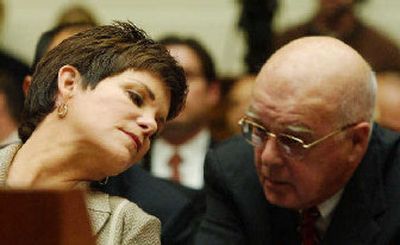Lawmakers compare HP scandal to Enron, Watergate

WASHINGTON — The saga of Hewlett-Packard Co.’s spying scandal — which has toppled the company’s chairwoman, two other directors and at least two high-ranking executives — deepened in intrigue Thursday as lawmakers exploring the imbroglio summoned comparisons to Watergate and Enron.
Members of the House Energy and Commerce Committee demanded to know how investigators for the respected Silicon Valley anchor could use tawdry tactics such as “pretexting,” or impersonating HP directors, employees and journalists to obtain their phone records.
In one key document cited by the panel, an HP investigator had warned higher-ups, including the company’s now-fired chief ethics officer, that the methods used to find the source of boardroom leaks were possibly illegal and at the very least could damage the company’s reputation.
But few answers emerged. Ten people involved in the cloak-and-dagger operation — including the former ethics officer and General Counsel Ann Baskins, who resigned Thursday — asserted their Fifth Amendment right against self-incrimination, refusing to answer questions.
The panel heard from CEO Mark Hurd, who replaced Patricia Dunn as chair last week. He apologized for the investigatory tactics but denied having direct knowledge of the probe’s methods.
“If Bill Hewlett and Dave Packard were alive today, they’d be appalled,” he said, referring to the company’s revered founders.
Hurd said Dunn had told him of the existence of the investigation but he was not involved in the probe itself.
Earlier, during hours of questioning, Dunn stumbled at times and corrected herself when asked how much she knew of the shady tactics, including when she learned that the investigators had used pretexting to obtain telephone records. While saying she was unaware of the details, she repeatedly defended the probe as necessary to stem serious leaks of confidential information.
“If I knew then what I know now, I would have done things very differently,” Dunn said. Still, she said, “I do not accept personal responsibility for what happened.”
She said it wasn’t until July that she became aware that pretexting was part of the “standard arsenal” of the investigators’ tactics.
“I dispute having ever understood or being told that the fraudulent use of identity was ever a part of this investigation,” Dunn insisted.
Fred Adler, an investigator in the company’s security department, told the panel he had heard that Vince Nye — his colleague who had warned superiors on the boardroom leak probe — also had complained about previous use of pretexting.
HP’s outside lawyer, Larry Sonsini, who appeared with Dunn, insisted that contrary to recent news reports, he never took the position that pretexting is legal. He also testified he and his firm were “not involved in the design or conduct of the investigations.”